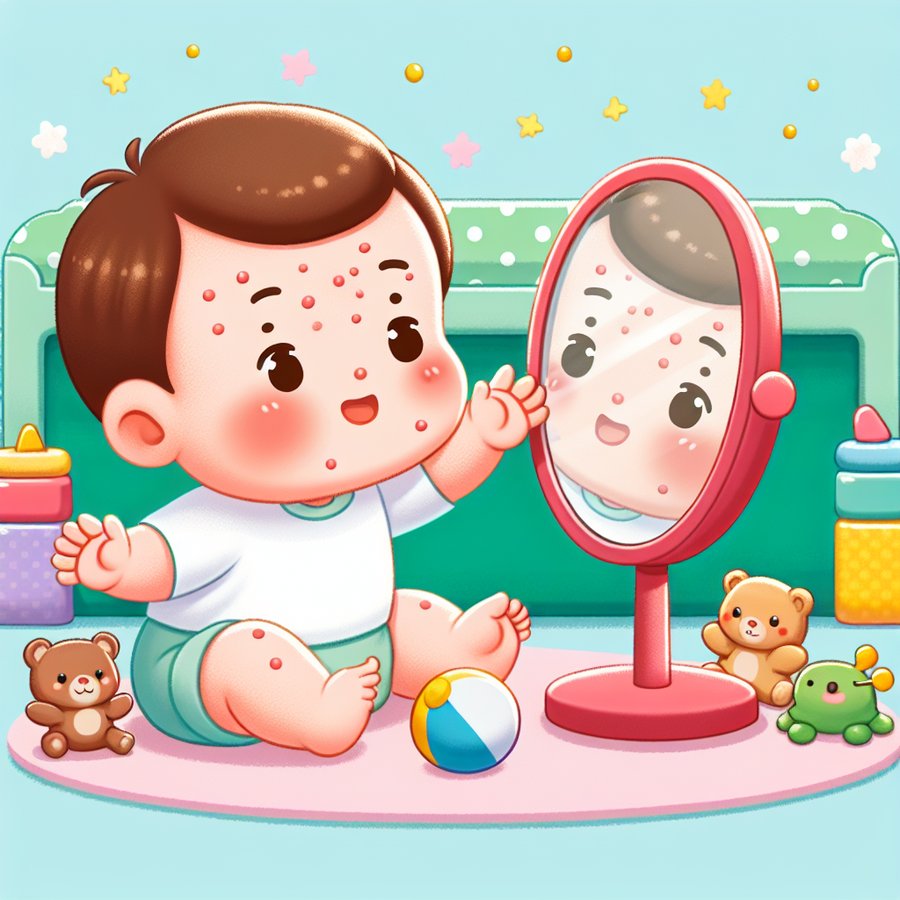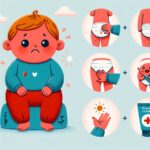Baby acne, a common condition that affects many newborns, often leaves new parents worried and full of questions. Despite its alarming appearance, baby acne is generally harmless and temporary. This article aims to provide in-depth insights into what causes baby acne, how to treat it, and steps for prevention, ensuring parents have the knowledge they need to care for their baby’s skin confidently.
What is Baby Acne?
Baby acne, medically known as neonatal acne, typically appears on a baby’s face, including cheeks, nose, and forehead. It can occasionally affect the neck, upper chest, and back. These small, red, or white bumps can emerge anywhere from a few weeks to several months after birth. While the exact cause of baby acne is unknown, it is thought to be related to maternal hormones that stimulate the baby’s oil glands. This temporary condition is most common in male infants and usually clears up on its own within a few weeks to a few months.
Understanding baby acne is crucial for new parents, as it helps differentiate between this benign condition and other potential skin issues that may require medical attention. For detailed information on skin conditions that might resemble baby acne, such as eczema, refer to our comprehensive guide on Atopic Dermatitis.
How to Treat Baby Acne
Although baby acne typically resolves without any treatment, there are steps parents can take to help manage the condition and keep their baby’s skin healthy. First and foremost, it’s essential to keep the affected area clean and dry. Gently cleanse the face once a day with water and mild baby soap, then pat dry. Avoid using oily or greasy skincare products, as these can exacerbate the condition.
It’s also important to note that certain home remedies or over-the-counter medications should not be used on babies without consulting a pediatrician. If baby acne is persistent or if you’re concerned about your baby’s skin, it’s best to seek advice from a healthcare professional. For more tips on caring for your baby’s skin, check out our article on Baby Skin Care.
Baby Acne Prevention Tips
While it’s challenging to prevent baby acne entirely due to its hormonal causes, maintaining good skin care can help minimize outbreaks. Ensure that anything that comes into contact with your baby’s skin is clean, including clothes, bedding, and towels. Use detergents that are free from fragrances and dyes, which can irritate sensitive skin. Also, avoid excessive skin cleaning, which can strip the skin of natural oils, leading to further irritation.
Regularly monitoring your baby’s skin for any changes or signs of irritation is essential. Early detection and proper care can help manage baby acne and other skin conditions effectively. For parents seeking more information on how to maintain their baby’s overall health, explore our resources on Eczema and Cradle Cap, two other common conditions that affect infants.
When to Consult a Doctor
While baby acne is generally not a cause for concern, there are instances when consulting a healthcare provider is necessary. If the acne persists for several months, seems to be worsening, or is accompanied by other symptoms such as fever, lethargy, or poor feeding, it’s crucial to seek medical advice. These could be signs of an underlying condition that requires prompt attention.
In rare cases, baby acne can lead to more severe skin conditions. A healthcare professional can offer guidance on treatment options and provide reassurance to worried parents. For concerns related to baby acne or any unusual changes in your baby’s health, don’t hesitate to contact your pediatrician.
FAQs: Common Questions About Baby Acne
Many parents have questions about baby acne, seeking clarity on this common condition. Here are some frequently asked questions and their answers:
- Is baby acne a sign of future skin problems? No, baby acne is not indicative of future skin conditions and usually resolves on its own.
- Can I apply breast milk to baby acne? While some parents report success with this home remedy, it’s best to consult a pediatrician before applying breast milk or any substance to your baby’s acne.
- How long does baby acne typically last? Baby acne can last a few weeks to a few months but generally clears up without any treatment.
- Is there a difference between baby acne and milk rash? Yes, baby acne is caused by hormonal influences, while milk rash is caused by contact with milk on the skin’s surface and is not related to acne.
For more in-depth answers and resources on baby health, explore our extensive library of articles, including those on Bottle Feeding and Breastfeeding, to support you through your parenting journey.













